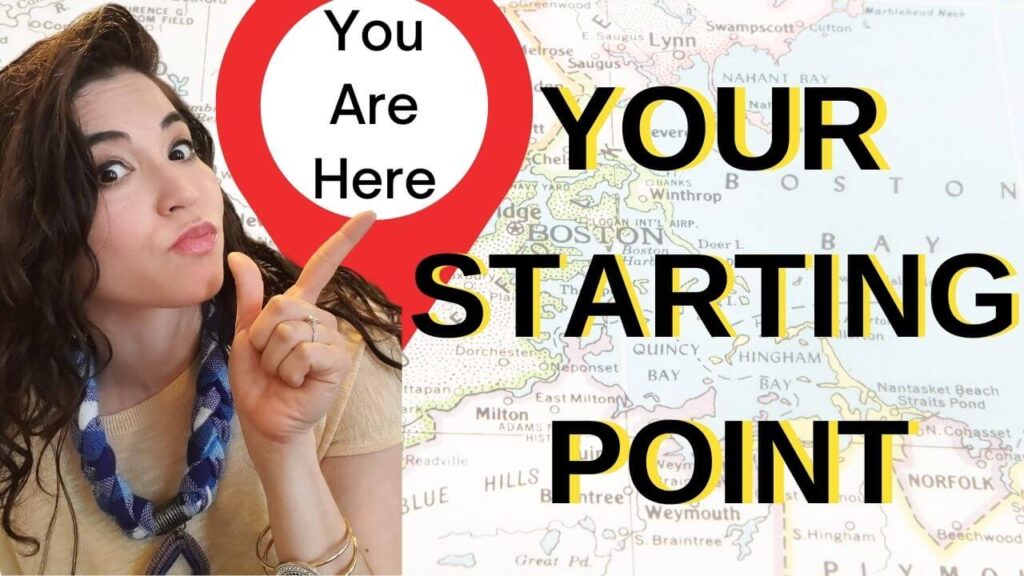Congrats on your decision to buy a home!
The first step in buying a home is to get pre-approved from a mortgage lender, bank, or credit union. Many sellers won’t consider a bid unless you are pre-qualified/pre-approved. The pre-approval letter tells us how much house we can afford based on your credit, income, downpayment, and other information that the lender will collect. We will use the pre-approved amount to guide us in our search for the right home for you. A pre-approval letter is similar to the starting point when getting directions from Google Maps – you need to know your current standing in order to determine the best way to get to your destination (your dream home).
5 Things You Should Know Before Talking To a Mortgage Lender
1. Find Your Ideal Monthly Payment
Avoid being house poor. The time to be honest with yourself has come. Make a list of all your monthly expenses, and subtract them from your monthly take-home pay to determine the monthly payment that will allow you to live comfortably.
Why is this important? Buying a home is one of the largest financial decisions you will face. For the next 15-30 years, you will be making a mortgage payment every month.
How to arrive at your ideal monthly payment?
Make a list of all your current fixed and variable expenses (estimate, if needed). Add up all of the expenses to determine your current financial obligations.
Fixed expenses are those that are consistent every month and include things such as rent, a car payment, insurance, gym membership, cellphone, and internet. Variable expenses are those which tend to vary from month to month. Examples of variable expenses include restaurants, morning coffee run, entertainment, utility bills, grocery shopping, etc.
Most of these costs will follow you to your new home, but some will change or be eliminated altogether. The house you’re moving into is likely larger than your apartment, but it may be closer to your work. Your utilities will be higher, but your transportation costs may be lower. Your mortgage could be lower than your rent. You may even be able to negotiate a cheaper price for the internet as well if you move to a different area.
- Psst, looking to cut expenses? Start with variable expenses. They are usually easier to curb.
- Tip! add a line item for savings. Get in the habit of stashing away some cash on a monthly basis. Even if it’s a small amount, it counts.
- Check out smartasset.com for a more in-depth explanation of fixed vs variable costs.
2. Set Your Buying Timeline
Determine your buying timeline. We will work backward to determine your buying timeline.
- When is your lease ending? How many months in advance do you need to give notice to not renew the lease?
- On average it takes 45-60 days to close on a home under contract. Being under contract means that an offer was submitted, accepted, inspections are completed, and lawyers signed.
Example: Your lease ends on June 30th and you need to give a 30 day notice not to renew (May 31st). This means that we need to be under contract by May 1st at the latest to have enough time to close on your house (60 days) by the time your current lease ends. This means we would like to have our offer submitted and accepted by April 15th.
Here is a quick view into the home buying process. For more details, make sure to download the complete home buying guide for FREE.
- The buyer decides on a home, home search.
- The buyer makes a formal, written offer.
- The seller accepts the offer and the buyer makes 1st earnest money deposit
- The home is inspected
- Both buyer and seller sign a purchase and sale contract (HOUSE IS UNDER CONTRACT)
- The buyer’s 2nd earnest money deposit into an escrow account or equivalent.
- The buyer submits all required paperwork to a lender to line up a mortgage.
- The home is appraised (for the lender’s sake).
- The lender approves a mortgage
- The deal is closed.
Working backward again, we will budget 60 days to close once the house is under contract (steps 5-10); 10 days to complete all inspections (step 4); 3 days to negotiate the submitted offer (steps 2 and 3).
Step 1 is home searching. This is the fun part! You have full control of this step and its timeline. I have worked with clients who fell in love with a home within one week of house hunting and I have had others who took six months to find the right home.
Let me tell you there is no perfect home, but there is the right home for you.
The location and price for a home will be perfect, but the layout will not be OK. During our home search, we will focus on areas that we cannot change such as location and size. Check out the next post for what to look for when house hunting.
3. Gather Required Documents to get Pre-approval
- Tax records for the last two years
- Collect proof of income including proof of employment for the last two months. These can be pay stubs.
- Job offer letter stating your annual or monthly income if you just started your job.
- Print out your bank and investment accounts for the past 90 days, these include all assets, bank statements, 401K, stocks, Roth IRA, etc
- Gather previous addresses and current landlord’s contact information.
The lender may have additional requirements.
4. Shop Around!
Request quotes from multiple lenders and comparison shop for loans.
According to the Consumer Financial Protection Bureau, all inquiries for credit checks done by mortgage lenders are recorded as a single inquiry. The impact to your credit is the same no matter how many lenders you consult, as long as the inquiries are done in the same 45-day window.
Each lender has their own model to set a pre-approval spending limit. Comparing multiple letters will tell you if all lenders are in the same ballpark or who is the outlier.
STORYTIME: A few years back, I had a client who received a pre-approval from a big lender and an accepted offer in her dream home in Lynn, MA. After inspections and a lot of back and forth the bank can’t move forward with her loan. At that point most deals would be dead.
Fortunately, she previously shopped and got another pre-approval letter. We quickly engaged the second lender. He was able to move in quickly as he was already familiar with her situation. In the end, the closing was delayed for one week and my sweet buyer got to spend New Year’s Eve in her new home.
So, my beautiful people, please shop around.
5. Prepare Questions to ask the Lender
- What type of mortgage programs do you offer and what is the downpayment required?
- Do you work with/offer first time home buyer programs?
- Do you offer mortgage points?
Mortgage points are fees that you pay directly to the lender to reduce your interest rate. According to Investopedia: “Mortgage points come in two varieties: origination points and discount points. In both cases, each point is typically equal to 1% of the total amount mortgaged. On a $300,000 home loan, for example, one point is equal to $3,000.
Discount points are prepaid interest. The purchase of each point generally lowers the interest rate on your mortgage by up to 0.25%. Most lenders provide the opportunity to purchase anywhere from one to three discount points.”
- Do you offer a pre-qualification or pre-approval?
Lenders can issue both letters. For a pre-qualification letter, the lender will ask you about your income, credit score, and assets. This information will not be verified.
- A pre-approval letter has more weight to a seller than the pre-qualification letter as the former goes through more verification. Lenders will verify your information about your assets, income, and credit score for a pre-approval letter.
TIP! When possible, get a pre-approval letter over a pre-qualification letter!
As we mentioned above, the credit check will count as one as long as all your mortgage inquiries are within the same 45-day window
- What is your average timeline to close?
Does it align with your buying timeline?
- What is the average closing costs in the State?
This will give you a general idea of how much costs you should expect. These costs include but are not limited to: origination fee, appraisal fee, attorney, title insurance, etc.
- What are your upfront fees?
Ask the broker how they are being compensated and what fees, if any, you have to pay for their services/

